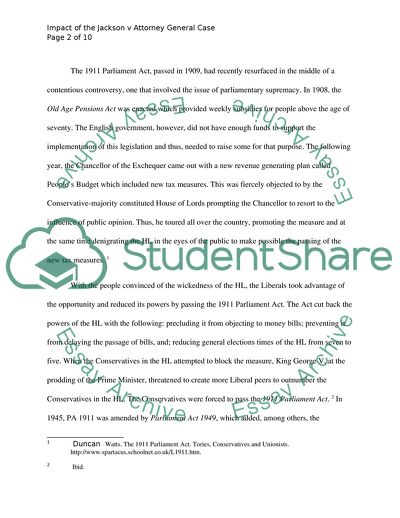Cite this document
(The Impact of the Jackson v Attorney General Case on Parliamentary Sup Study, n.d.)
The Impact of the Jackson v Attorney General Case on Parliamentary Sup Study. Retrieved from https://studentshare.org/law/1733056-having-regard-to-legal-commentary-including-the-articles-referred-to-below-critically-analyse-the-impact-of-jackson-v-attorney-general-2005-ukhl-56-on-parliamentary-supremacy-in-english-law-today
The Impact of the Jackson v Attorney General Case on Parliamentary Sup Study. Retrieved from https://studentshare.org/law/1733056-having-regard-to-legal-commentary-including-the-articles-referred-to-below-critically-analyse-the-impact-of-jackson-v-attorney-general-2005-ukhl-56-on-parliamentary-supremacy-in-english-law-today
(The Impact of the Jackson V Attorney General Case on Parliamentary Sup Study)
The Impact of the Jackson V Attorney General Case on Parliamentary Sup Study. https://studentshare.org/law/1733056-having-regard-to-legal-commentary-including-the-articles-referred-to-below-critically-analyse-the-impact-of-jackson-v-attorney-general-2005-ukhl-56-on-parliamentary-supremacy-in-english-law-today.
The Impact of the Jackson V Attorney General Case on Parliamentary Sup Study. https://studentshare.org/law/1733056-having-regard-to-legal-commentary-including-the-articles-referred-to-below-critically-analyse-the-impact-of-jackson-v-attorney-general-2005-ukhl-56-on-parliamentary-supremacy-in-english-law-today.
“The Impact of the Jackson V Attorney General Case on Parliamentary Sup Study”. https://studentshare.org/law/1733056-having-regard-to-legal-commentary-including-the-articles-referred-to-below-critically-analyse-the-impact-of-jackson-v-attorney-general-2005-ukhl-56-on-parliamentary-supremacy-in-english-law-today.


